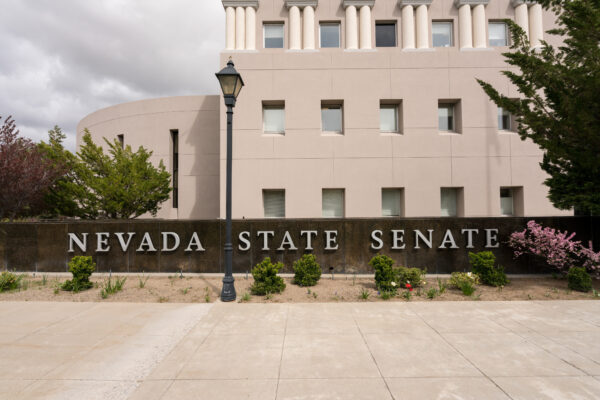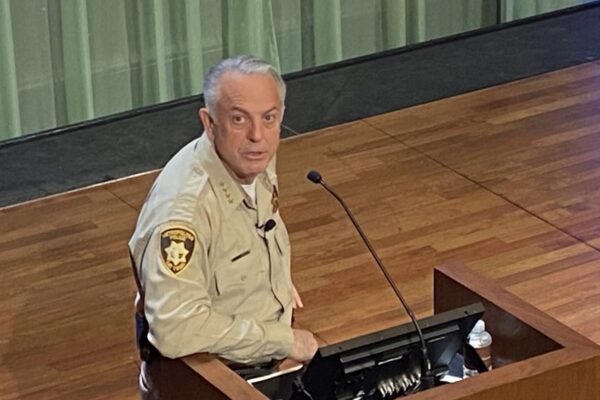By Jeniffer Solis and April Corbin Girnus, Nevada Current
This piece was originally published in the Nevada Current.
Tuesday — and the wee hours of Wednesday — brought a plot twist to the Nevada State Legislature and Gov. Joe Lombardo’s sweeping crime bill, with the introduction of an amendment adding provisions that would protect students from Immigration and Customs Enforcement and a brand new bill whose language mirrors two key components of the crime bill.
In a late-night meeting, lawmakers introduced Senate Bill 9, which contains the crime bill’s “opt out” resorts corridor language and provisions that would make punishments stricter for people who attack hotel workers.
The Senate also passed Assembly Bill 4, known as the governor’s crime bill, but with an amendment. The amendment would require detention centers to maintain real-time, publicly available lists of all the people they are detaining. The amendment would also prohibit school districts from allowing access to law enforcement — like ICE — from accessing school grounds or records without a lawful order or warrant.
AB4 passed 16-2 with bipartisan support. Democratic state Sens. Dina Neal and James Ohrenshall cast the two votes against. Republican state Sens. Robin Titus, Jeff Stone and John Ellison were not present at the meeting.
The bill now heads to the Assembly, which will have to vote on adopting the amendment.
The amended bill reflects some of the asks of immigration advocates and the Latino Legislative Caucus, who have publicly criticized the Republican governor and Democratic legislative leadership for not taking action on immigration.
Together, the introduction of the immigration-focused amendment, paired with a stripped-down parallel crime bill, set up a scenario where the Republican governor might veto his own marquee crime bill and instead pass a less comprehensive bill that would still get across the finish line priorities for the resort industry and Culinary union.
What’s in the crime bill
The amended crime bill covers several areas of criminal law — from increasing penalties for DUI-related offenses to expanding the definition of stalking to banning criminal offenders from the resort corridor — and more.
During the regular session earlier this year both the Assembly and Senate passed different versions of the bill. The Senate was forced to adjourn before they were able to vote on adopting the Assembly’s amendment.
The bill has received criticism from civil liberty groups who say it is an attempt to rollback modest criminal justice reforms passed by lawmakers in 2019.
Washoe County District Attorney Chris Hicks, who helped present the bill to lawmakers, called the bill “common sense criminal justice reform” and said it would not roll back those 2019 provisions, which were aimed at reducing Nevada’s growing prison population and recidivism rates.
“We are not talking about a rollback of AB236,” Hicks told lawmakers during an Assembly committee hearing, referring to the 2019 measure. “Nothing in this proposed bill rolls back AB236. What we are talking about is what will help all Nevadans.”
The legislation attracted a slew of testimony opposing key provision in the bill, with some provisions drawing more ire than others.
One of the more controversial provisions would allow courts to ban certain criminal offenders from the resort corridor for up to a year. The bill includes language giving the Justice Court the authority to reestablish a Resort Corridor Court – a short-lived specialty court created to deal with low-level crimes on the Strip that was disbanded amid questions about its legality.
The bill, however, had the backing of the politically-hefty gaming industry and was co-presented by the Nevada Resort Association. Several gaming companies spoke in support of the crime bill, including Red Rock Resorts, Caesars Entertainment, Boyd Gaming Corporation, MGM Resorts International, and Wynn Resorts.
Provisions in the crime bill mirror the functions of the Resort Corridor Court, which gaming industry leaders argued was effective at deterring low-level crimes on the Strip, often by barring offenders from entering the tourist district for months at a time.
The bill would require Nevada’s two most populous countries — Clark and Washoe County — to adopt ordinances creating one or more high-traffic corridors where harsher penalties could be imposed because of higher risk to public safety.
“Recidivism continues to be a significant issue in our tourism areas,” Virginia Valentine, the president and CEO of the Nevada Resort Association, told lawmakers during an Assembly committee hearing. “During the resort court operation, resort security reported a decrease in crime.”
Athar Haseebullah, the executive director of the ACLU of Nevada, argued the bill would privatize part of the judicial system for the purpose of banning homeless people from the resort corridor.
“This was a court used to target the unhoused. If it was only about gaming properties, it would have been limited to what occurs inside of the casinos, but it’s not. It was used to target people on the street beyond this,” Haseebullah said during an Assembly hearing.
One portion of the crime bill expands the definition of stalking to include dating relationships and cyberstalking via social media.
Marc Randazza, one of the top First Amendment lawyers in the state, said those provisions are well-intended but “wildly unconstitutional.”
“I would be happy to work with you on a solution, but this legislation is wildly unconstitutional, please do not sign it. I will be challenging it if you do,” Randazza said Tuesday in a social media post tagging Lombardo.
The bill would list defamation, threats, and inciting violence on social media as unprotected by the First Amendment and punishable under the bill. It would also define continued social media communication towards someone without their consent within those categories as unlawful.
During committee hearings in the Assembly, the Clark County Public Defender’s Office also raised concerns that language around social media in the bill was “overly broad.”
Don Southworth, the offender management administrator for NDOC, said a community transition program included in the bill could potentially reduce the overall population in custody, offsetting some costs.
“We do expect a population reduction of as many as 500 offenders that would be eliminated from our in-house custody,” Southworth told lawmakers during an Assembly hearing.
The alternative correctional program established in the crime bill would focus on offenders within 18 months of discharge, who are non-violent offenders that fit specific criteria, said NDOC Director James Dzurenda. The program would include home visits, release plans, and monitoring through a contract with a company, including video visiting and drug testing.
Several other measures were included in the crime bill. The bill adds kidnapping and attempted kidnapping to the list of felony domestic violence offenses. Under the bill, child pornography possession would be charged per image. The bill eliminates automatic sealing of records for offenses against children or the elderly. It also increases penalties for DUI-related offenses and establishes an alternative correctional program.
Other provisions in the bill include defining “smash and grab theft” as a felony if property damage and theft value exceeds $750. The bill would also require a mental health evaluation for children who have committed multiple attacks on school employees or child welfare professionals before they can return to school.
—“This was a court used to target the unhoused. If it was only about gaming properties, it would have been limited to what occurs inside of the casinos, but it’s not. It was used to target people on the street beyond this."
Athar Haseebullah
Executive Director, ACLU of Nevada
Other crime and safety bills
Assembly Bill 6 would enhance penalties for certain traffic violations in active school zones and school crossing zones. It would also give school districts the ability to extend the time for school zone enforcement. The bill comes amid a sharp increase in the number of students hit by vehicles in school zones this year. The Senate unanimously passed AB4 on Tuesday. The bill heads back to the Assembly, which will need to approve an amendment made by the Senate. After that, it will head to the governor’s desk.
Assembly Bill 1 would bolster cybersecurity initiatives in the wake of a major cyberattack that paralyzed multiple state offices and services for weeks. AB1 has been delivered to the governor for final approval.
Assembly Bill 3 would boost privacy protections for public officers who wish to keep personal information confidential. The Nevada Press Association opposed the bill arguing it goes far beyond existing exemptions and would error transparency. AB3 has been delivered to the governor for final approval.



